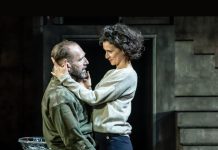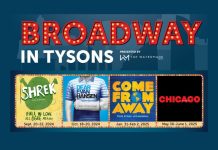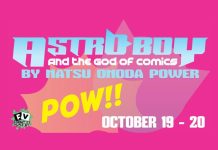Landless Theatre Company has taken another classic Tony Award-winning Best Musical – Rupert Holmes’ The Mystery of Edwin Drood – and has adapted it into a Symphonic Metal production. Producing Artistic Director Andrew L. Baughman takes us on this journey.
Joel: Why was The Mystery of Edwin Drood the perfect choice to turn into a Symphonic Metal production?
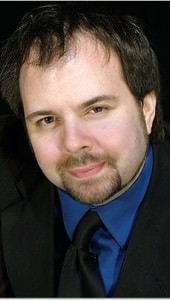
Andrew: After the success of Sweeney Todd [Prog Metal Version], we knew that our second “MetalTheatre” production would need to be something very different and unexpected. We couldn’t be a one-trick pony. Sweeney was such a natural fit for metal given the dark story and the operatic structure of the show. It was a no-brainer in that sense.
One element of a metal concert that is very difficult to capture in musical theatre is the interaction between the audience and performers. Drood, as you know, absolutely breaks the fourth wall – we get to boo and hiss the villain, characters lobby to be awarded encore performances, and of course, the audience gets to vote upon the ending of Charles Dickens’ unfinished mystery story. Drood’s Dickensian story has dark undertones (there’s sex and drugs – just add rock-and-roll), but there are also bawdy and comedic elements to the show that allow us capture another side of the metal experience. The genre of Symphonic Metal was the best fit for Rupert’s score that includes soaring orchestral ballads like “Moonfall.”
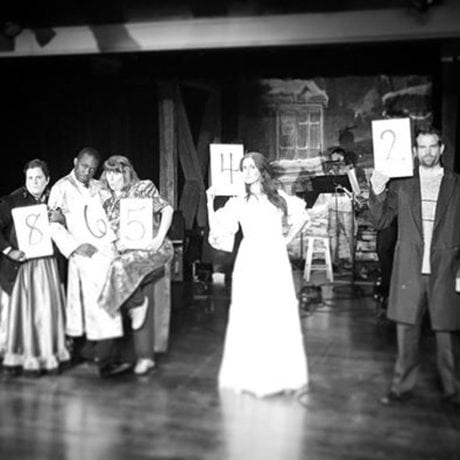
Drood has also been very personal to me, and influential to Landless. As a teenager, I was greatly inspired by a community production of Drood by Wildwood Summer Theatre in Montgomery County. This had to have been in 1993 or 1994. That production embodied the kind of excitement I wanted to capture with Landless productions, and our company was named in part after the show (two bizarre characters in the show are the twins Neville and Helena Landless).
Take us on the journey of getting the rights, working with Composer Rupert Holmes, finding musicians, adapting and working on the music/score and introduce us to the cast.
In the beginning, I was working with Tams-Witmark to secure rights to adapt a different show. A somewhat more obvious choice for “metallization,” and hopefully one we will also get around to. We had obtained partial permission, but there were several other rights holders who needed to sign off. Growing a little impatient with the process, I noticed that Drood was also in the Tams-Witmark Catalogue – and beyond my love for the show, it occurred to me that Rupert Holmes was ONE GUY who wrote the book, music, and lyrics. And that he just might be crazy enough to let us mess around with his baby. I wrote Rupert an email, and sure enough, he was game to let us experiment with Drood.
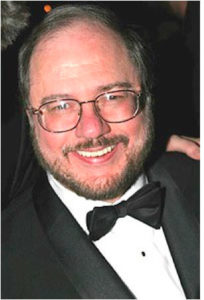
Rupert is a master composer and lyricist, of course, but I believe he’s the greatest musical bookwriter of our time. He really is as funny and clever in person as he is on the page, too. As generous as Rupert is with his time to answer questions about his show and his process, he has taken a hands-off approach to letting us orchestrate the metal score. We really appreciate him giving us the freedom and space to experiment.
There was significant turnover in The Fleet Street Collective (our team of arrangers). Some of our Sweeney musicians had moved away, some had family situation changes, and some had other jobs that needed to take precedence. Ray Shaw and I remained, and Andrew Siddle had already contributed “Moonfall.” We signed on some exciting fresh blood: Matt Farkas of the band Master Sword, Zach Pinkham (also band conductor and co-music director), and drummer John Maestri who contributed many of his own drum parts.
Rupert also allowed us to adapt the script slightly for a streamlined cast of 11 that function as principal characters and ensemble. Most of our cast members are returning members of last year’s production of Sweeney Todd: Malcolm Lee stars as Chairman William Cartwright, Ally Jenkins plays The Princess Puffer, Shaina Kuhn (our fantastic Beggar Woman) takes on a different turn as the ingenue Rosa Bud, Andre Brown plays Neville Landless, talented youngsters Dylan Ngo and Alexis Turbat (who played Tobias) once again share the role of Deputy, and I play the opium-addicted choirmaster John Jasper.
We welcome newcomers Eric Jones as Bazzard, Jason Hoffman as Rev. Crisparkle, and metal singer-songwriter Mary Patton as Helena Landless. Rounding out the cast are longtime Landless audience favorites Matt Baughman as the drunken Durdles, and Karissa Swanigan in the title role of Edwin Drood.
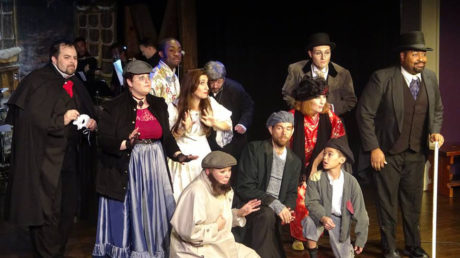
Introduce us to the designers and how they have brought Director Melissa Baughman’s vision to the stage.
Melissa makes it very clear that MetalTheatre is not a gimmick, her vision is simply to tell stories using metal for heightened musical effect, much like Hamilton tells its story through hiphop. Costumer Terri Magers put together Victorian inspired costumes, you won’t see leather and chains or spandex. Sound Designer Jim Wauters keeps it simple with concert style wired mics, and the lighting, by Carey Raugh, and the set by Jared Davis, is also simple and minimalist, putting full focus on the musicians and the actors.
What have been the most difficult challenges and how were those challenges met and resolved?
Oddly, our greatest challenge was finding guitarists. Our own guitarists had moved away, and we had arranged the music for them to play. It turns out that many metal guitarists do not read sheet music, and of those others who applicants who did, a high number of them withdrew because they didn’t feel they could play the music. Fortunately, we found Shepherd Music grad Tom Collins, and in one of those divine accidents, discovered virtuoso electric violinist Jason Labrador. We adapted our lead guitar part for electric violin, and that turned out the be the secret ingredient for Symphonic Metal.
https://www.youtube.com/watch?v=fvm2kOGjklQ&feature=youtu.be
What did you learn from your Metal version of Sweeney Todd that helped you adapt The Mystery of Edwin Drood?
We learned the value of thinking small. Landless has decided to focus on developing one MetalTheatre show per year with the thought that we will keep each show in rep for years, and working on funding tours of those shows to different cities.
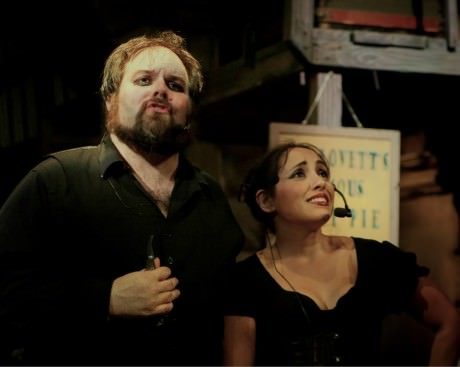
Steven Sondheim gave us his blessing to continue work with Sweeney, and we hope Rupert will like MetalDrood enough to do the same. The problem with Sweeney is that we built the show for a large band, a large ensemble, and we designed a very elaborate set. It would be very expensive to take Sweeney it on tour. Drood has a streamlined cast of 11, a band of 5, and a concert style set that would be very easy to store and take anywhere. We are much better set up for touring this time!
How would you describe the score of The Mystery of Edwin Drood? Which songs are your favorites and which new arrangements are your favorites and why?
Melissa started the process by pointing us to some Symphonic Metal bands for inspiration: Nightwish, Epica, and Stratovarius. Like both sides of a coin, there really are two sides to Drood: the melodramatic play-within-a-play, and the zany atmosphere of the Music Hall Royale. We heighten those extremes through our arrangements. Rupert’s score, while containing inherent nods to Victorian operetta, does draw upon a number of more contemporary styles. We sort of ran with that concept in creating the Symphonic Metal Version.
“Moonfall” is my favorite song from the original show, and it translates seamlessly to Symphonic Metal in Andrew Siddle’s arrangement. My favorite arrangement in our show is Ray Shaw’s furious “Both Sides of The Coin,” which works so well that if you didn’t know better, you might think the song was originally written as metal. The most “metal” arrangement of the show, however, is Matt Farkas’ arrangement of “A British Subject,” a song that didn’t even appear on the original cast album, and that I believe elevates to a standout in the Symphonic Metal orchestration. Zach Pinkham wrote a very interesting jazz-influenced arrangement of “The Garden Path To Hell,” which provides a breath of fresh air to the production.
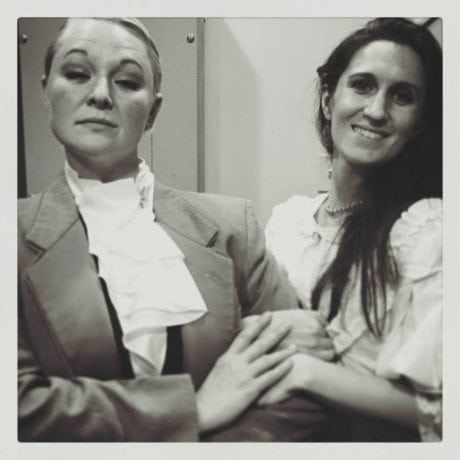
Of my own arrangements, I’m very pleased with the opening number “There You Are.” Rupert’s song included a lot of complex chords that you wouldn’t hear in metal, but I didn’t want to strip everything down to fifths, either. So I came up with an arrangement that turns on a dime from Iron Maiden style metal to ELO style 70’s pop. It lets the audience know right off the bat that we’ll be playing fast and loose with genres over the course of the show, and that the Music Hall Royale is going to be a very fun place for all. “The Name of Love and Moonfall” also translated into a textbook Symphonic Metal Beauty and The Beast-style duet between Rosa and Jasper, which is also very exciting.
What do you want audiences to take with them after seeing The Mystery of Edwin Drood?
We want metal audiences to become enthused about going to theatre, and vice versa for theatre audiences experiencing metal for the first time. I also think that Drood, in spite of winning the Tony, is still a somewhat under-appreciated and under-produced musical, so I also hope we will introduce a gem of a show to audiences that might be unfamiliar with it.
The Mystery of Edwin Drood is playing through September 25, 2016, at Landless Theatre Company performing at The Arts Barn – 311 Kent Square Road, in Gaithersburg, MD. For tickets, call (301) 258-6394, or purchase them online.
LINK:
‘Their Metal Will Be More Than Tested’: Landless Theatre Company Announces Development of ‘The Mystery of Edwin Drood (Symphonic Metal Version)’ by Andrew L. Baughman.



